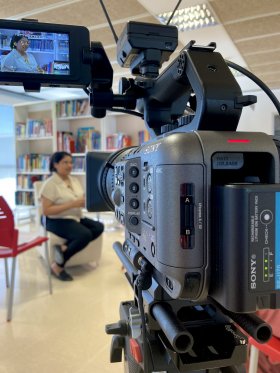Srishti Goyal


PhD Programme: Economics and Business
Research group: QURE – Quantitative, Urban and Regional Economics
Supervisor: Maria Llop Llop
Bio
Her education has been in the realm of economics. She did her B.A. (Hons.) Economics from the University of Delhi and M.Sc. Economics (with specialization in environment and natural resources) from TERI School of Advanced Studies (TERI SAS). She wrote her master's thesis on 'Dematerialization and Income Distribution' with the aim to tread a path to well-being and growth simultaneously by addressing all the three components of sustainable development (i.e., economic, social, and environmental). Her thesis propounded that more egalitarian income distribution can pave the way to dematerialization which will positively affect the well-being of both, the environment and humans. She has always been interested in interdisciplinary research, as demonstrated by her education and work experience. She began her professional journey as a Research Consultant at UNESCO MGIEP that helped her understand the policy space at the macro level, and it introduced her to how different stakeholders engage with the government to bring policy discourse that positively impacts their and the society's interest at large. Thereafter, she went on to work as a Research Associate at Young Lives India, where she gained the managerial, research, strategic, and operational experience, that has refined her organizational, analytical, problem-solving, and communication skills. She has worked with multicultural and multidisciplinary teams which included educationists, psychologists, lawyers, environmentalists, and disability experts. Her academic and professional experience has guided her interest in evidence-based research that informs policy. Now, she has joined the Department of Economics at Universitat Rovira i Virgili as a doctoral researcher under the Martí i Franquès COFUND Programme. She aspires for her work to have a positive discourse on the policy environment and contribute effectively to the sustainable development goals (SDGs).
Project: Climate Change and its Distributional Impacts
Climate change involves unexpected events such as hurricanes, droughts, floods, extreme temperatures and heat waves, hurricanes, cyclones, and wildfires. The consequences of these meteorological events on humans and societies are expected to be materialized in food scarcity, water shortages, migrations, productivity changes, production changes, impacts on health, changes in settlements, loose of key infrastructures, and changes in the consumption and saving patterns. The research project will use the Computable General Equilibrium (CGE) modeling to analyze climate change issues. A CGE model can be defined as an empirical representation of an economy in which all the markets are interrelated and the prices of goods, services and primary factors guarantee a situation of equilibrium in this economy. In the last years, CGE has shown its usefulness to analyze the economic impacts of climate change. In general, however, contributions in this field have been mostly applied to climate change mitigation measures while adaptation strategies have not deserved so much attention from environmental research. In addition, most general equilibrium contributions use a macroeconomic perspective that, being limited to aggregated variables, does not allow to identify the climate effects on individuals. Nevertheless, the latest international climate strategies combine both mitigation and adaptation processes and pay special attention to the distributional impacts of climate events. The most outstanding objective of this research project is to evaluate the consequences of climate change on private welfare, inequality and income distribution worldwide, by using a general equilibrium perspective of the transmission impacts that takes into consideration not only the mitigation measures but also the adaptation processes. Bearing in mind that the climate affectation on individuals' welfare and the transmission channels among countries are mostly unknown to date, the proposal will provide new and valuable knowledge to be used in environmental and economic planning. In this research, the multi-country general equilibrium model for the world economy will be used to show the economic, social and environmental consequences of climate change following two different stages. First, the general equilibrium model will provide the macroeconomic impacts on the main socioeconomic variables, such as levels of sectoral production, prices, and agents' income. Second, the use of detailed data in the socioeconomic structure of the model (consumers' disaggregation, labor categories, and other social groups) will provide specific and individualized impacts allowing an accurate and precise evaluation of the involved impacts. Such individualized information will allow to deepen into the income distribution and welfare consequences of climate events. The expected results will allow a more accurate and downscaled economic assessment of climate change, a decrease in uncertainties concerning the socioeconomic consequences of climate impacts, a contribution to major international scientific assessments and a positive impact on international research forums and academic journals.
Awards & Prizes
- 3rd Best team in the AS300 Student-led Economic Case Challenge competition (2023), Adam Smith Tercentenary, University of Glasgow.



